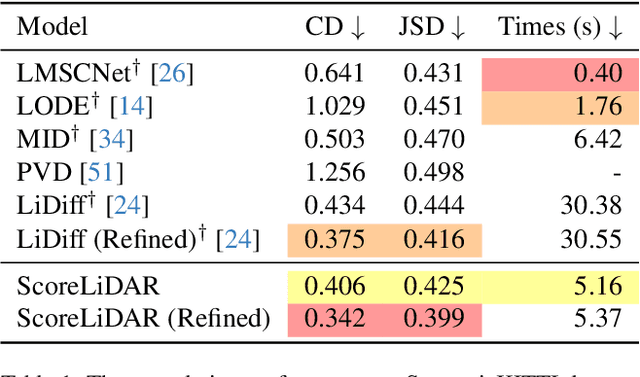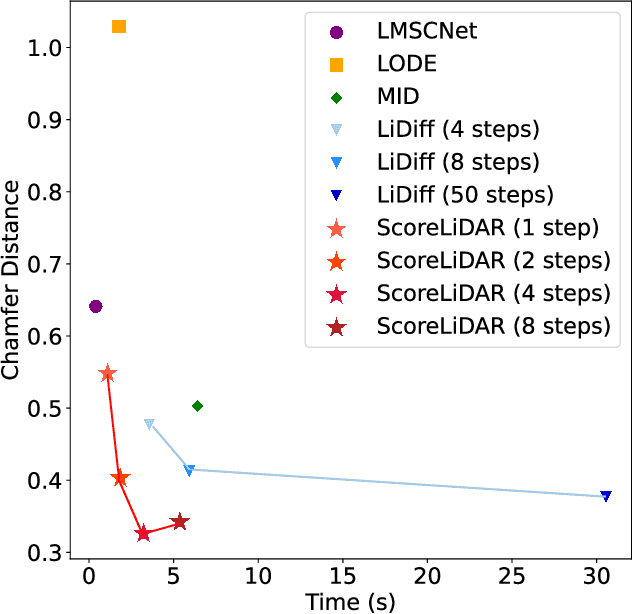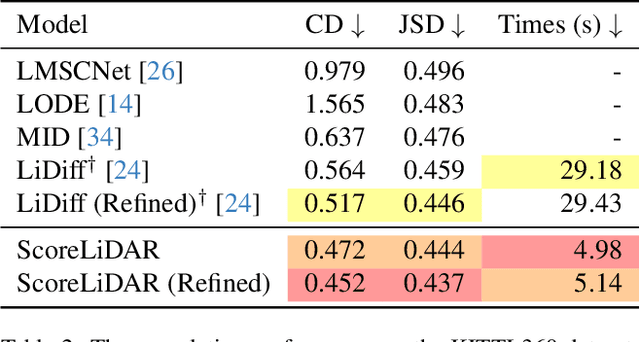AnYang Wei
Diffusion Distillation With Direct Preference Optimization For Efficient 3D LiDAR Scene Completion
Apr 16, 2025Abstract:The application of diffusion models in 3D LiDAR scene completion is limited due to diffusion's slow sampling speed. Score distillation accelerates diffusion sampling but with performance degradation, while post-training with direct policy optimization (DPO) boosts performance using preference data. This paper proposes Distillation-DPO, a novel diffusion distillation framework for LiDAR scene completion with preference aligment. First, the student model generates paired completion scenes with different initial noises. Second, using LiDAR scene evaluation metrics as preference, we construct winning and losing sample pairs. Such construction is reasonable, since most LiDAR scene metrics are informative but non-differentiable to be optimized directly. Third, Distillation-DPO optimizes the student model by exploiting the difference in score functions between the teacher and student models on the paired completion scenes. Such procedure is repeated until convergence. Extensive experiments demonstrate that, compared to state-of-the-art LiDAR scene completion diffusion models, Distillation-DPO achieves higher-quality scene completion while accelerating the completion speed by more than 5-fold. Our method is the first to explore adopting preference learning in distillation to the best of our knowledge and provide insights into preference-aligned distillation. Our code is public available on https://github.com/happyw1nd/DistillationDPO.
Distilling Diffusion Models to Efficient 3D LiDAR Scene Completion
Dec 04, 2024



Abstract:Diffusion models have been applied to 3D LiDAR scene completion due to their strong training stability and high completion quality. However, the slow sampling speed limits the practical application of diffusion-based scene completion models since autonomous vehicles require an efficient perception of surrounding environments. This paper proposes a novel distillation method tailored for 3D LiDAR scene completion models, dubbed $\textbf{ScoreLiDAR}$, which achieves efficient yet high-quality scene completion. ScoreLiDAR enables the distilled model to sample in significantly fewer steps after distillation. To improve completion quality, we also introduce a novel $\textbf{Structural Loss}$, which encourages the distilled model to capture the geometric structure of the 3D LiDAR scene. The loss contains a scene-wise term constraining the holistic structure and a point-wise term constraining the key landmark points and their relative configuration. Extensive experiments demonstrate that ScoreLiDAR significantly accelerates the completion time from 30.55 to 5.37 seconds per frame ($>$5$\times$) on SemanticKITTI and achieves superior performance compared to state-of-the-art 3D LiDAR scene completion models. Our code is publicly available at https://github.com/happyw1nd/ScoreLiDAR.
 Add to Chrome
Add to Chrome Add to Firefox
Add to Firefox Add to Edge
Add to Edge